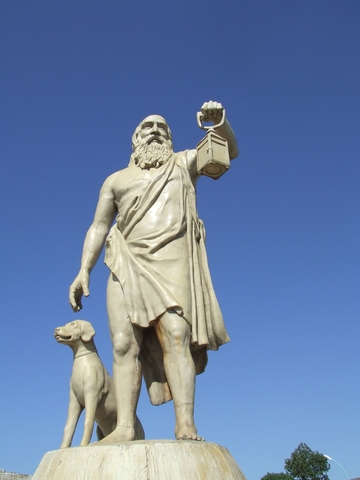 Diogenes of Sinope
Diogenes of Sinope
If someone calls you a cynic, they probably don’t mean to be kind. A cynic – as the word is used now – is a pessimist – at best world-weary, at worst ruthlessly unscrupulous. The origin of the word, though, might seem a little surprising: it derives from an ancient Greek word meaning 'dog-like’ or ‘doggy’. But what has cynicism to do with dogs?
The answer lies with philosophy, and, in particular, a philosophical movement that began in Ancient Greece. The movement started with two men – Antisthenes and Diogenes of Sinope. Antisthenes is said to have been the first Cynic, but Diogenes is perhaps the better known. If nothing else, he is famed for his choice of habitation – an empty wine jar. (Modern writers often put him in a barrel or even a tub.) Antisthenes and Diogenes were philosophers who called themselves dogs.
Why dogs? One reason has to do with their rejection of conventional values. For the Cynics, the conventional markers of a successful life – wealth, privilege and power – were to be despised, rather than admired. A successful life, they held, is a virtuous life, lived in accordance with nature; to live this kind of life requires only the most basic necessities. So Diogenes lived in the street, begging when he had to. He ate, slept (and did everything else he needed to do) in the open, without shame or embarrassment. When someone asked him where he was from, he replied ‘I am a citizen of the world’. He was constantly striving for greater simplicity: when he saw a boy mopping up lentils with a piece of bread, it’s said he threw away his spoon. For Diogenes, being truly human means living like a dog.
Cynics were like dogs in another way too: they barked at people. That is, they said exactly what they thought, without fear or favour. Just as doctors prescribe nasty medicines, Antisthenes said, philosophers deliver unpleasant truths. No writings by Antisthenes or Diogenes survive, so we have to rely on later writers to get a flavour of what they dished up to their victims – abusive, witty and nonchalantly insolent by turns. Their targets included philosophers, musicians, athletes, playboys, politicians and kings. It’s reported that Diogenes was once visited by Alexander the Great, who found Diogenes relaxing in the sun. ‘Is there some favour I can grant you?’ the great man graciously asked. ‘Yes’, Diogenes replied. ‘You can stop blocking my light.’ The story may be apocryphal, but the style is recognisably his.
Cynicism never became one of the great schools of philosophy, but the Cynics left an important legacy. Their emphasis on simplicity, self-sufficiency and living in accordance with nature were taken up by later philosophers, especially the Stoics. Many of their concerns -- free speech, personal liberty, cosmopolitanism -- are still pressing issues today. And, of course, the Cynics have given a word to the English language, one that reflects their growling impatience with the rest of humanity, but not their dogged pursuit of virtue.



Rate and Review
Rate this article
Review this article
Log into OpenLearn to leave reviews and join in the conversation.
Article reviews